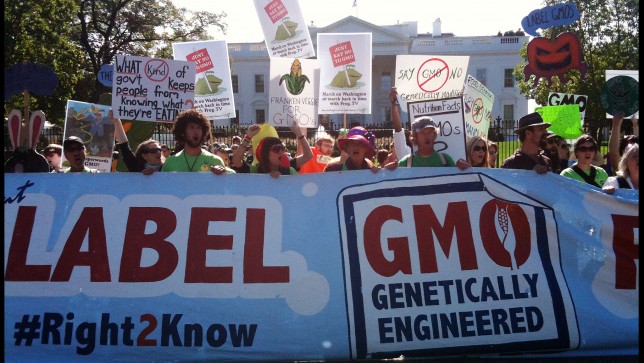The United States Department of Agriculture’s Food Safety Inspection Service (FSIS) informed Sustainable Pulse on Monday that they will allow multi-ingredient products, which include GMO fed animal products, such as eggs, meat or poultry, to be labeled Non-GMO.

Sustainable Pulse requested further details on the FSIS guidelines published in August, due to ‘confusing’ language regarding which products will be able to be labeled non-GMO.
FSIS confirmed that for “single ingredient products, such as a steak, plain chicken breast or ground beef, and the animal that the meat came from was fed GMO feed, that product cannot be labeled as non-GMO.”
However FSIS added; “For a multi-ingredient product, such as a meat pie, a third party organization certifies the product as non-GMO. If the third party’s standards allow for an animal to be fed GMO feed, and the meat from that animal is used in a multi-ingredient product, like a meat pie, then the entire product may be labeled with a non-GMO claim.”
FSIS also confirmed to Sustainable Pulse that dairy products are regulated by the Food and Drug Administration (FDA), not by the Food Safety and Inspection Service (FSIS). The FDA has not yet released guidelines for the GMO labeling of dairy products.
Sustainable Pulse Director, Henry Rowlands, stated Thursday; “GMO feed for animals is much more important than the GMO food for people to the Biotech Industry, so it is not surprising that the GMO labeling guidelines released by FSIS give the GMO feed industry a boost, however, this will now cause major confusion for consumers across America.”
According to the National Corn Growers Association in 2015, 93% of all corn grown in the United States is GMO, of which 39.1% is used for animal feed, 30.3% for fuel, 12.5% for exports and only 10% in total for the food/alcohol industry in the U.S. This data is just an example of the importance of animal feed to the Biotech Industry.
FSIS have chosen not to follow the ‘gold standard’ German example on GMO labeling. To market food that is free of even traces of GMOs, Germany allows the use of a label indicating “No Genetic Engineering” (Ohne Gentechnik). For meat and meat products to qualify for the label, the animals must have been fed a GMO-free diet for lengthy periods before slaughter.
Ronnie Cummins, International Director at the Organic Consumers Association, added; “Unfortunately the FSIS guidelines are consistent with the prevailing trend at the U.S. federal regulatory level to protect industry profits at the expense of human health and environmental safety. Allowing products that contain ingredients from GMO-fed animal products to be labeled Non-GMO is just another shameless example of a government handout to corporations.”
“We will have to educate consumers on why they must never trust the Non-GMO label, and how in the future, the only way to avoid GMO ingredients will be to buy certified organic products, or to research their local farmers and suppliers to ascertain whether or not the meat and dairy products they sell in local stores and farmers markets are derived from animals that are 100-percent grass-fed and/or fed only organic, non-GMO feed,” Cummins concluded.
Why Have the FDA not Published GMO Labeling Guidelines for Dairy Products?
The delay in the publishing of GMO labeling guidelines by the FDA comes as Monsanto are making a move to further influence the largest Dairy manufacturing and marketing association in America through its revolving doors policy; The International Dairy Foods Association (IDFA) is soon to be headed up by Monsanto’s Michael D. Dykes.
For the past 19 years, Dykes served as vice president of government affairs for Monsanto, where he was responsible for developing and implementing a portfolio of U.S. government relations strategies and programs that included agricultural biotechnology policy. He led Monsanto’s office in Washington, D.C., and served as the company’s primary point of contact for elected officials, regulatory authorities, U.S. farm organizations, key industry participants, trade associations, international organizations and embassies. He directed the company’s efforts in state and local government affairs, in addition to government affairs in Mexico and Canada.
Dykes will assume the role of president and CEO of IDFA in January 2017.
Warren Taylor, Co-Owner of Snowville Creamery in Ohio, reacted to the appointment of Dykes and the delay in GMO labeling guidelines for dairy; “Whether IDFA picked Michael Dykes, or whether he was forced on IDFA by Monsanto and the corn growers, it is clear that consumers’ desire for dairy products produced without GMOs will not be tolerated.”
Taylor continued, “For over a year Chobani’s website has declared “contains only natural non-GMO ingredients” despite the fact that the cows producing their milk supply eat GMO grain. After over a year of written complaints to FDA, all the way up to the Secretary of Agriculture, Snowville Creamery has yet to receive a single response. This is unprecedented in my 40 years of experience. The fundamental precept that food labeling cannot be misleading has apparently been abandoned. America’s democracy is based on the principle of informed choice. Citizens are being denied an informed choice regarding their childrens’ food. We should be outraged!”
Snowville Creamery recently commissioned a poll carried out by Public Policy Polling which found that 76% of people expect that a non-GMO dairy label would mean the cows were fed non-GMO feed.


















